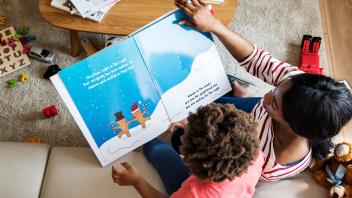Infants and toddlers
Helping your child love books
You’ll find sharing books together is a great way to bond with your son or daughter and help your child’s development at the same time. Give your child a great gift that will last for life — the love of books.
Like all children, your child will learn and develop, yet she will likely develop more slowly than other children her age. Reading aloud and talking about the story and the pictures will help your child improve her vocabulary and help teach grammar. When your child reads to you or names objects on the page, she will get added practice to improve her memory and her spoken language skills. As your child grows, talk to her occupational therapist and teachers about ways reading and word-matching games can help improve her reading skills.
Tips for reading with your infant or toddler
Each time you read to your child, you are helping her brain to develop. Reading to your child helps her understand that there are words and pictures on the page. So — you’ve planted the seed to reading that will stay with your child throughout her life.
Try reading for a few minutes at a time at first. Then build up the time you read together. Your child will soon see reading time as fun time and learning time!
Here are some things you can try:
- Buy books or borrow books from the library that have thick, sturdy pages.
- Find books that have rhymes. Clap your hands and help your baby clap along to the rhythm of the words.
- Find books that teach everyday things, such as colors, shapes, numbers, and letters.
- Read aloud. Talk about the pictures and read the text. Help your toddler point to objects you name in the book.
Suggested books for your infant
- I Can, Can You? , by Marjorie W. Pitzer
- Books by Laura Ronay, such as Kids Like Me…Learn ABCs or Kids Like Me…Learn Colors
- Books by Rena D. Grossman, such as Families or Eating the Rainbow
Suggested books for your toddler
- Dr. Seuss’s ABC
- Feelings , by Susan Canizares
- The Feelings Book , by Todd Parr
- Hugs and Kisses , by Roberta Grobel Intrater
- My Very First books by Eric Carle, such as My Very First Book of Colors , My Very First Book of Numbers , My Very First Book of Shapes , or Eric Carle’s ABC
Preschool and school-age children
Helping your preschooler or school-age child love books
Remember, when you read to your child often and combine reading time with cuddle and play time, your child will link books with fun times together.
Here are some things you can try:
- Borrow books from the library on topics that can strengthen your child’s daily living skills, such as books about bedtime or going to the dentist. Also, pick books about things your child enjoys, such as animals.
- Read aloud and talk about the pictures. Ask your child to name objects or read aloud.
- Praise your child’s efforts at reading!
- Find books that have buttons to press that make sounds, and buy audio books.
Suggested books for your preschooler or school-age child
- At the Seashore , by Ruth Koeppel
- Poke-A-Dot Old MacDonald’s Farm , by Travis King
- Sounds on the Go! , by Gail Donovan
Books to help children and parents learn more about intellectual disabilities
For children
- Hi, I’m Ben and I’ve Got a Secret , by Julie A. Bouwkamp (Ages 3–8)
- My Friend Isabelle , by Eliza Woloson (Ages 4–8)
- Susan Laughs , by Jeanne Willis (Ages 4–8)
For parents
- Babies with Down Syndrome: A New Parent’s Guide , edited by Susan Skallerup
- Early Communication Skills for Children with Down Syndrome: A Guide for Parents and Professionals , by Libby Kumin, Ph.D.
For more information
- American Association on Intellectual and Developmental Disabilities : (800) 424-3688
- The ARC (formerly the Association for Retarded Citizens): (800) 433-5255
- Centers for Disease Control and Prevention : 800) CDC-INFO
- Easter Seals : (800) 221-6827
- National Dissemination Center for Children with Disabilities : (800) 695-0285
- National Down Syndrome Society : (800) 221-4602
Developmental Disabilities Literacy Promotion Guide for Pediatric Healthcare Providers. ©2010 Reach Out and Read, Inc. All rights reserved. Reprinted with permission.


